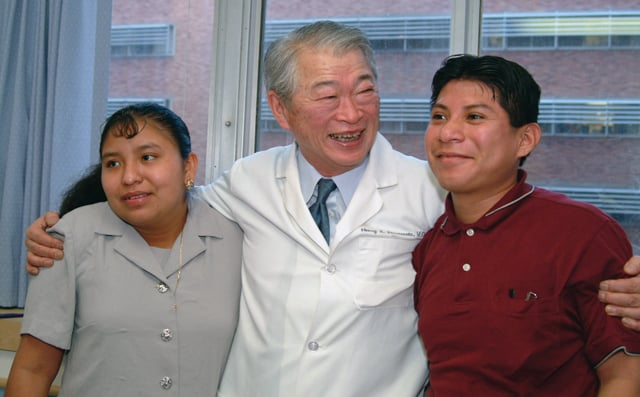Henry Kawamoto, Jr., 81
Company: Self-employed
Background: Now retired, Henry Kawamoto, Jr. was director emeritus of craniofacial (skull-jaw-face) surgery for UCLA’s Craniofacial Clinic, and a clinical professor of plastic and reconstructive surgery. He was one of two surgeons to led a team in 2002 that surgically separated a pair of formerly conjoined Guatemalan-born twins during an operation at Mattel Children’s Hospital UCLA, a case that gained international notoriety. His specialty was performing reconstructive surgery on children’s faces after correcting disfiguring skull and facial defects stemming from birth, disease or trauma. After joining UCLA in 1975, Kawamoto became the first L.A. plastic surgeon trained in the craniomaxillofacial specialty.
Kawamoto also served as a captain in the U.S. Army Military Corp. in the late 1960s after his first residency, and in a Japanese hospital in general surgery and maxillofacial surgery. He’s been recognized with numerous medical, dentistry, plastic surgery, research, teaching and civic awards, served on several surgery-related industry boards, including the American Board of Plastic Surgery, and authored scientific articles. He holds Doctor of Dental Surgery and Doctor of Medicine degrees.
How many hours a week do you work?
Two to six hours.
Why not retire?
I am, but I need to continue to exercise my mind, so I go on lecturing tours.
Have your work habits changed much since you approached, and then passed, retirement age?
Yes, since I don’t have to run an office and attend meetings, I can do as I please.
How do you go about learning new technologies, and is that necessary for your work?
I attend meetings, read journals and give lectures.
Do co-workers seek out your experience and knowledge?
Yes. I am invited to continue to give lectures to UCLA residents; I assist on complicated cases and attend bi-monthly clinics. I also continue to do visiting professorships and conferences through the U.S. and the world.
How do you keep the work you do fresh and interesting?
The field does it itself.
What are the biggest changes you’ve observed in your workplace environment across your career, and what are key aspects that have never changed?
The presence of government interference. Personal satisfaction has never changed.
Are there advantages to working at your age? If so, what are they?
I can work when I want to.
What do you do for fun?
Since retiring, I have taken up yoga and routinely go to the gym. I also do sea kayaking.

